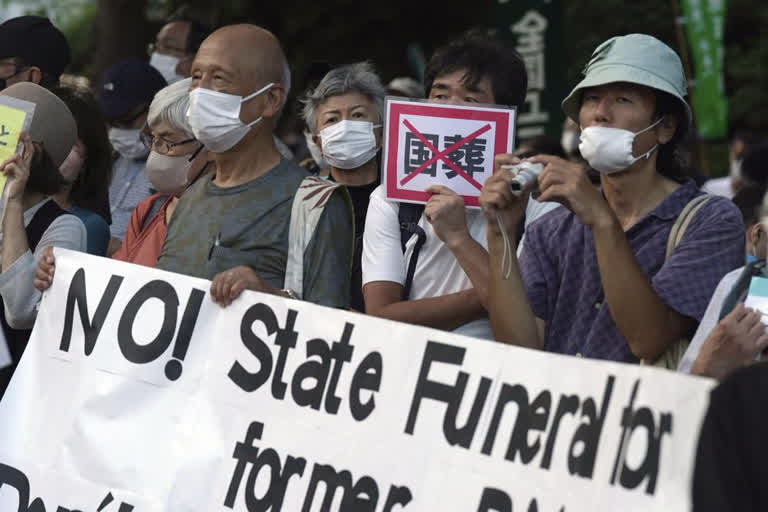Tokyo: A rare state funeral for Shinzo Abe, the former prime minister who was assassinated in July, has split Japan. The hawkish Abe was one of the nation's most divisive postwar leaders, but it is the ruling party's cozy ties with the ultra-conservative Unification Church that has fired up much of the opposition to the funeral.
Prime Minister Fumio Kishida is battling a near-continuous political fallout from his handling of both the links to the church among his party's lawmakers and the state funeral he says Abe deserves. A look at some of the reasons why the state funeral on Tuesday is causing so much anger.
WHO GETS A STATE FUNERAL IN JAPAN?
The tradition has roots in a ceremony performed by the emperor to honour those who made exceptional contributions to the country. The emperor before World War II was revered as a god, and public mourning for those honored with state funerals was compulsory. Most state funerals were for members of the imperial family, but political and military leaders were also honored, including Isoroku Yamamoto, who commanded Japan's Pearl Harbour attack and died in 1943.
The state funeral law was scrapped after the war. Japan's only other state funeral for a political leader since then was held in 1967 for Shigeru Yoshida, who signed the San Francisco Treaty ending the US occupation of Japan and restoring ties with the Allies. Because of criticism that the Yoshida funeral was held without any legal basis, subsequent governments scaled down such events. A state funeral contradicts the spirit of democracy, said Junichi Miyama, a historian at Chuo University.
WHY IS ABE GETTING A STATE FUNERAL?
Kishida says Abe deserves a state funeral because he was the longest-serving leader in Japan's modern political history and for his diplomatic, security and economic policies that elevated Japan's international profile. Kishida, noting Abe's assassination during an election campaign, says Japan must show its determination never to bow to violence against democracy. Political watchers say holding a state funeral for Abe is Kishida's attempt to please ruling Liberal Democratic Party lawmakers belonging to Abe's conservative political faction so as to buttress his own grip on power.
Koichi Nakano, international politics professor at Sophia University, says the funeral is an attempt to whitewash Abe's legacy and to cover up scandals linked to the Unification Church. The church is accused of inappropriate recruitment and business tactics but denies the charges.
WHY IS IT CONTROVERSIAL?
Opponents say it's undemocratic, citing a lack of a clear legal basis and the unilateral decision by the Kishida Cabinet to hold the funeral. Abe's opponents recall his attempts to whitewash Japan's wartime atrocities, his push for more military spending, his reactionary view of gender roles and a leadership seen as autocratic and supportive of cronyism. Protests of the funeral have increased as more details emerged about Abe's and LDP lawmakers' connection to the Unification Church.
The South Korea-based church has built close ties with LDP lawmakers over shared interests in conservative causes. Abe's assassin reportedly was enraged about ties between Abe, his party and the church, which he said his mother had given all the family's money to. Abe, whose grandfather and former leader Nobusuke Kishi helped the church to take root in Japan, is now seen as a key figure in the scandal. Opponents say holding a state funeral for Abe is equivalent to an endorsement of party ties to the Unification Church.
